---------------------------------------------------------
Getting baby chicks can be such an exciting time! You want to believe your older girls will accept the babies and be good “mother hens”, but this is not the case. Your older flock is likely to not share your excitement about these new little pests eating their food and stealing their treats. You need to ease the flock into accepting the chicks by giving them plenty of time to get used to the idea. It’s important to keep the chicks safe because an adult chicken can easily kill a baby.
You should NOT try to introduce a single chick to your flock of older chickens. You need to at least provide the new chick with one friendly face to run to. If you only have one chick, she will become a target for bullies and the more she is bullied, the more others are likely to join in. If you have just a single chick, I would recommend you wait to start to introduce her until she is nearly full grown (around 14-15 weeks). You can read more about introducing a single adult hen here
Wait until chicks are at a minimum 4 weeks old to begin introductions, but 6 weeks would be better. The younger the chicks, the longer you are going to want to draw out the introduction period. Ideally, by the time you mix the flocks permanently, the chicks will be bigger and fully feathered out (around 10-12 weeks).
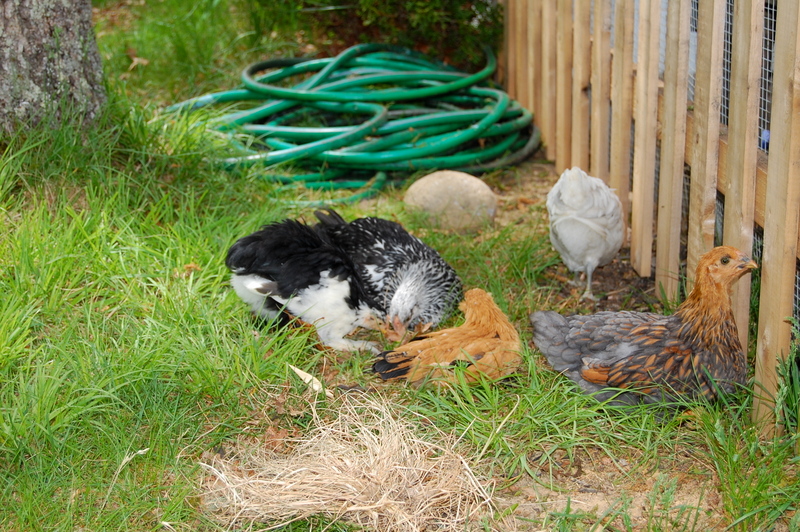
Introductions Step 1
The chicks will need an outdoor space next to the older flock, but separated by wire. The idea is to let everyone see & smell each other, but they can not touch each other. You can do this by dividing off part of your chicken area with wire. If you set up the chick space in your run, remember they will need a secure place to sleep. Click here to see how I built a spare coop for $2 that we could easily bring into the run when needed.
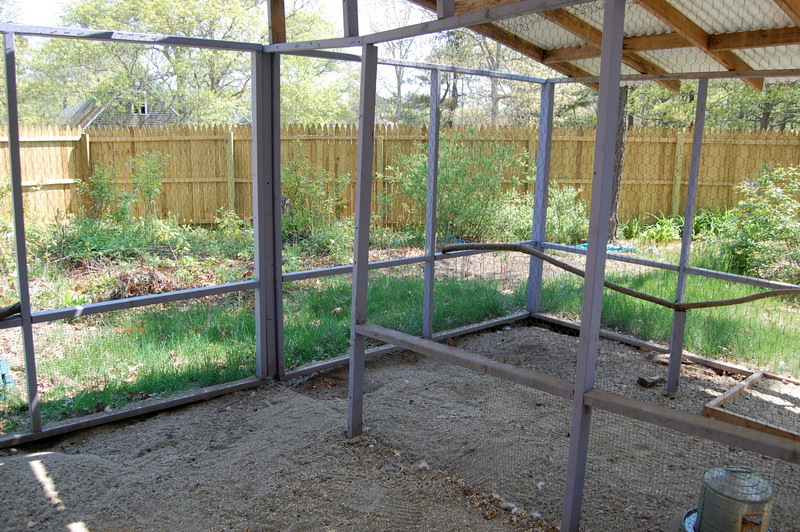
Instead of a second temporary coop, you can also section off part of your main coop for the babies. Now that we have a very large chicken barn, we just set up a wire rabbit exercise run inside of the chicken barn. The wire run is 87 inches by 41 inches. It has plenty of space for growing chickens and has a wire roof to prevent the older girls from jumping in. The grow out chicks can live here until they are ready to join the flock. Don’t forget the food & water for the babies, they will still need chick starter food until they are about 16 weeks old.
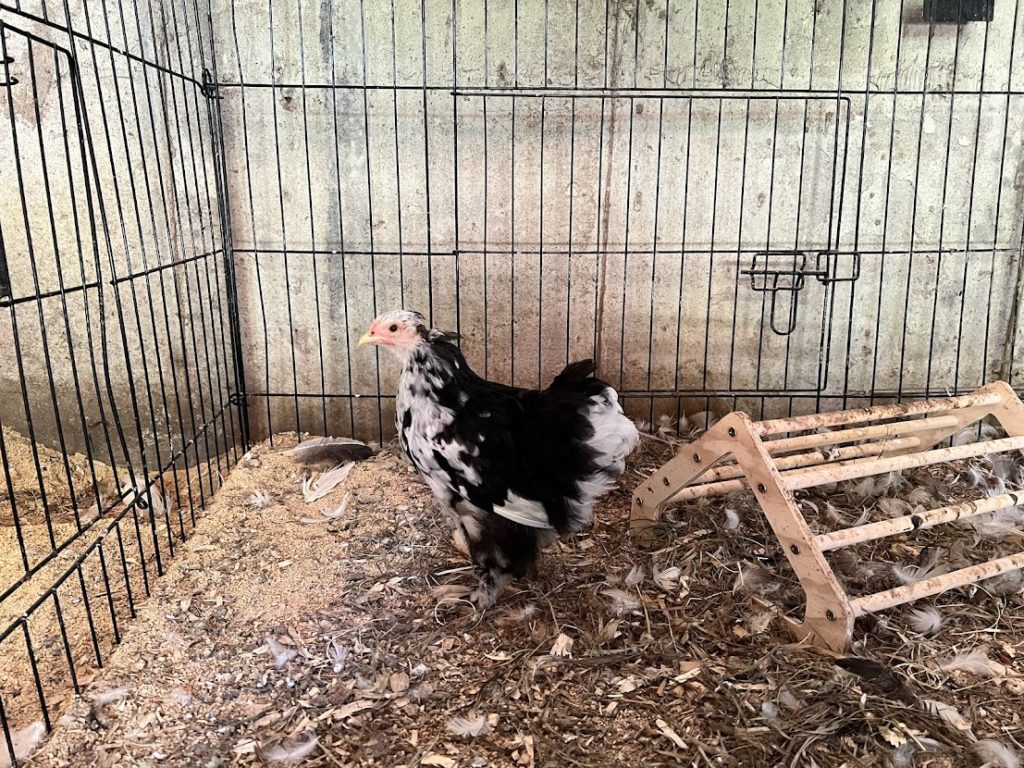
Let them live side by side but separated like this for at least two weeks, or until the younger chicks are at least 10 weeks old. If you moved the chicks to the transition space at 4 weeks, they will have to live there for 6 weeks.
Introductions Step 2
When the chicks are 10 weeks old, it’s time to join the main flock! Start by letting everyone out to free range together. Free ranging gives the little ones room to run away from a bully and it is also more neutral ground so the older chickens might not feel so defensive about sharing it.
Introductions Step 3
If free ranging goes alright for a couple days, take down the partition during the day. Continue to keep the chicks separated at night. At this point, you are going to need to switch the entire flock over to the chick’s grower feed. See the bag for manufacturer’s age instructions, but generally a young chicken needs to be on starter/grower feed until about 16 weeks in age (when they get ready to lay their first egg). Feeding chicks layer feed is not good because their kidneys can’t process all the calcium. So until the chicks are at laying age, everyone needs to be eating chick feed. It won’t hurt your big girls to be on chick feed, but they will need extra calcium for egg production. Providing a bowl of crushed oyster shells near the feed dish is a great supplement.
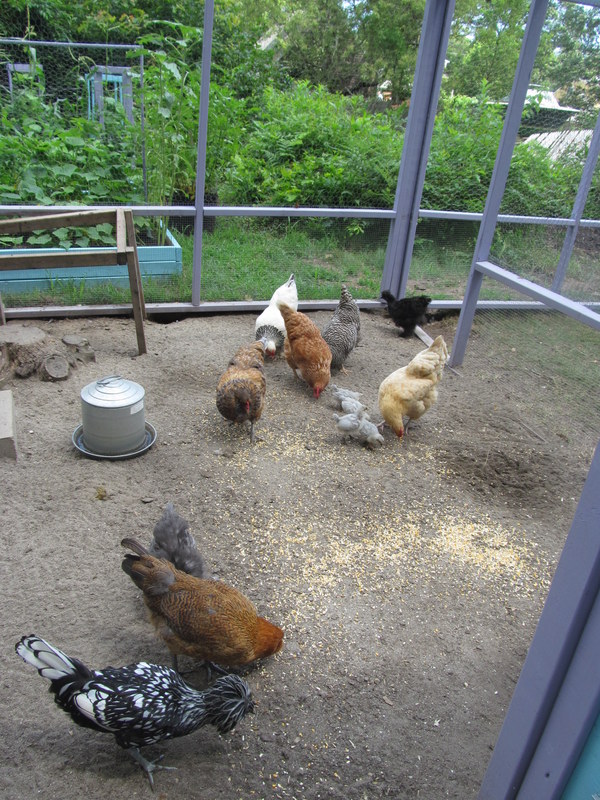
Introductions Step 4
After a week or so of daytime interacting it is time to fully mix the flocks! Remove the chick’s coop or take down the coop partition and keep your fingers crossed. You will need to be on hand the first couple nights to make sure all the chicks find their way into the main coop & roosts at night, but hopefully they will just follow the older chickens in.
Keep an eye on things for the next week and try to let them out as early as possible in the morning. If any of the chickens are injured or bleeding remove them immediately. Keep the injured bird in isolation until she is healed.




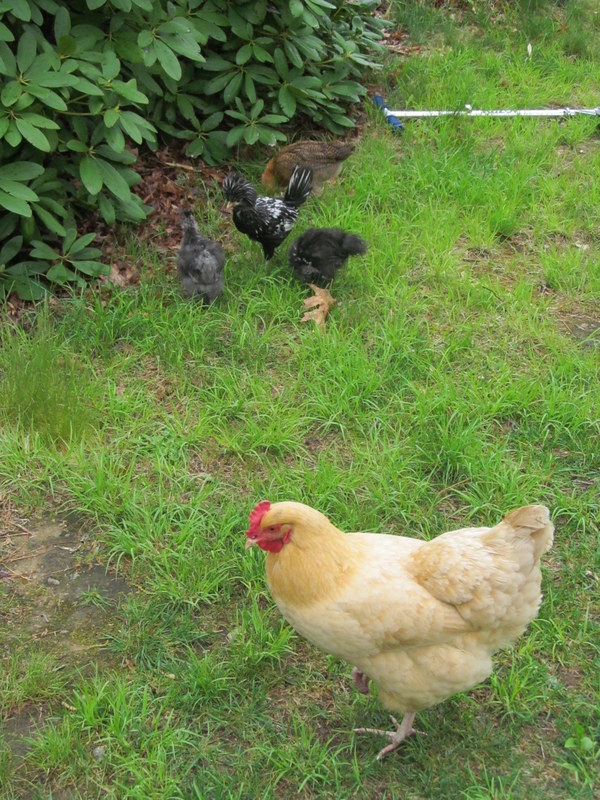
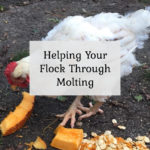
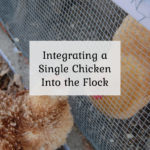
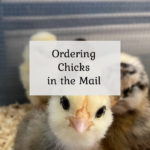
Laura
Tuesday 23rd of January 2024
Thank you for a very helpful article.
I am wondering if you may have any tips / advice on our situation. We have just started our flock and have hatched 6 barred rock chicks in the incubator (5 hens, 1 rooster). They were born 31 December so are about 3.5 weeks old. We have discussed that we would swap roosters with another person with purebred barred rocks when appropriate to be (probably overly) cautious about inbreeding. However her rooster is 12 weeks older than my baby hens. What age range would you recommend to introduce one older rooster to my 5 girls? They would also lose their brother to a new home at the same time. Thank you!
Liz
Tuesday 23rd of January 2024
I would not recommend you put an adult (or near adult) rooster in with young chicks. If the chicks are 3.5 weeks I wouldn't mix in any chick over 6 weeks. You will want to wait until the chicks are nearly full grown to introduce them to a rooster. A grown (or nearly grown) rooster will either see them as a threat and injure or kill the chicks or he will see them as mates and could injure them trying to mate them.
Kelly
Tuesday 21st of November 2023
What a great read! Thanks for the tips.
I have a baby chick ( 6 weeks ) with a mother hen in a separate enclosure from our other 4 birds. we live on a farm and they are free range. They can see one another, but she us safe. They chick and mum are both bursting to get out every time I open the door to change water / food. The little chick nearly has her full feathers down her neck.
Do you suggest that I let them free range during the day then keep them separate at night still ? and if so for how long ?
I need them to be free range and in the main coop in 3-4 weeks .
Any suggestions welcome!
Thanks
Kelly
Liz
Wednesday 22nd of November 2023
I would definitely start with free ranging them with the other 4 birds and see how it goes. You should certainly be able to get them intergrated in 3-4 weeks. My guess is after a week of free ranging they will all be fine together. good luck!
Valerija
Sunday 3rd of September 2023
We have 30 chicks 2 months and 23 hens and 5 roosters they are 5 months old is it possible to put them together?
Liz
Tuesday 5th of September 2023
You should be able to put them together - but you will still want to follow the slow introduction method from this article. Your roosters are just starting to enter maturity and could cause problems defending the area against the 2 month olds, so you won't want to just put them all together with no separation period
Melanie
Tuesday 6th of September 2022
So glad to find this post. But I still have an issue you might be able to help me with: I have 1 chick, 7 weeks old. We kept the mother hen and chick in a seperate brooder and run, leading into the field where the other (6) chickens roam, until 10 days ago. The flock had plenty of time to see and smell the chick (and mother hen, which they wouldn’t see during the broody period). 2 weeks ago the mother hen showed signs of despair of wanting to roam free again and she kind of started ignoring the chick, not communicating with it anymore. I let her out with the others but the chick was now lonely and confused why it’s only buddy, the mum, wouldn’t be there anymore. So we let the chick roam too, which the other chickens seem to accept. The chick gets though pecked and bullied when it enters a ‘smaller space’, a corner or the run, it then starts squeaking and trying frantically to run away and that’s when the big chickens start chasing it. The problem is the night, when the mother goes in the coop together with the flock. The chick follows her (desperately staying close to the mother all the time as it’s very scared of the bigger chickens) and will settle in the coop with the mother until the top hen comes in and pecks the mother and chick. So I keep on seperating the mother and chick in their own coop for the night. The mother doesn’t seem to be happy though to still ‘having’ to look after her chick and the idea of letting the chick settle/ roost on its own is sad too. What would you recommend to do? Thank you so much!
Liz
Wednesday 7th of September 2022
Awww poor baby! It is totally normal for mum to "abandon" her chicks around 6-8 weeks. She is done being a mom and ready to join her friends again. I would not keep the baby with the mom anymore as she is just as likely to turn on the chick as the other girls at this point. I actually recently had something sort of similar, we got 5 new chicks this spring which we raised in a brooder, 4 were standard size and 1 was a bantam. The bantam chick was MUCH smaller than her friends, but they were all nice to her. We put them all in a large wire cage inside the coop at 4 weeks. At 7 weeks we started letting the chicks out of their separate area into the larger flock free range area. The 4 bigger chicks did fine, no one seemed to really care about them joining in with free range time or roosting at night. But the little bantam for some reason everyone hated. On day 1 several big chickens ganged up on her and by the time I got to her the little bantam had a huge wound on her head. So we thought we would put all the chicks back in the separate area, but the bigger chicks had a taste of free ranging flock life and were very angry. They turned on their little friend and started picking at her and were generally just acting agitated. I hated to leave the little bantam chick on her own, but she was in danger being with other chickens (even her fellow chicks). So we let the standard size chicks out and kept the bantam in the separate area where she could still see everyone. It made it easier to treat her injury too. After a week she was healed so we tried again - the big chickens immediately went after her and tore open her scabbed over wound. I have NEVER had chickens act this aggressive towards a new chicken in over a decade keeping chickens. So bantam chick went back to her safe area. We left her in there for two weeks this time. So she was 10 weeks old now and all together had been living in this separate area in the coop for 6 weeks. The big girls and her fellow chicks chased her off but didn't try to hurt her. She eventually just started hanging out with the ducks who didn't mind her. After about a week of her hanging out on the edges of flock life and roosting on the ground she got the courage to hop on the roosts at night. She is now 12 weeks old and lives with the flock full time, she is definitely skittish and doesn't let any chicken come too close to her but she isn't being chased off anymore. So moral of the story is you can't make your chickens be nice - even if they are raised as hatchmates or if they are the mother. I would put the chick in the safe separate space by herself for a few more weeks. It's sad, but you need to keep her safe. If at all possible make it so she can be part of the flock in her separate space by seeing/smelling everyone. Making the mother stay in there when she is done mothering is a recipe for injury or death. By 9-10 weeks at the very least she will be mostly grown and can handle some light bullying. Good luck!! Hopefully in another few weeks they will all be a happy flock :)
Jenny
Tuesday 5th of July 2022
I had 5 eggs in incubator and only 1 hatched. So I put 11 more eggs in incubator and 9 hatched. So now i have 1 very tame hen aged 8 weeks and 9 chicks aged 5 weeks. They have been raised side by side so that they could hear each other but now when I put them out in the run for a while in the sunny weather the 5 week olds attack the 8 week old hen. She is very timid and just tries to get out of their way with no fighting back. Will they ever get on? Obviously i have a soft spot for her and hate the way they are treating her.
Liz
Tuesday 5th of July 2022
It can be so hard to see when your birds don't get along. This is a normal part of the pecking order process unfortunately. It can be hard for a single bird to meet up with a bonded flock, but they will eventually accept her into the flock. Just make sure the 8 week old isn't being kept away from the food & water and if anyone draws blood be sure to isolate the injured bird. In a few weeks they should all be getting along like one happy family, hang in there!